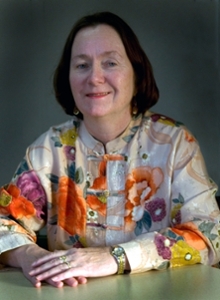Several urgent priorities in health care: the preparation of the next generation of nurses, the cultivation of health care researchers and the development of resources in cancer and end-of-life care are converging at the University of Utah College of Nursing through a T32 Grant from the National Institute of Nursing Research. Designed to assist schools in the recruitment of predoctoral and postdoctoral fellows in nursing, this training program addresses the National Institute of Nursing Research’s strategic areas including health promotion and disease prevention; improving quality of life through self-management, symptom management and caregiving; and end-of-life research. And, as a national leader in utilizing cutting-edge technology to deliver doctoral education in nursing to distance-based students, the college is able to recruit highly qualified students from diverse backgrounds and geographic locations.
That’s not all that makes the College of Nursing’s T32 Training Grant unique, say Ginette Pepper, PhD, RN, FAAN, associate dean for research and PhD program and Susan Beck, PhD, APRN, FAAN, AOCN, professor and co-director of the PhD Program. The two share leadership of the training grant under the multiple principal investigator mechanism at the National Institutes of Health. “The T32 training grant makes it possible for the college to prepare nurse scientists who develop rapidly into independent researchers, thereby contributing to the advancement of evidence-based nursing care to support health and speed healing,” says Pepper, who estimates the College of Nursing is one of just 15 schools in the nation with a T32 training grant. “The T32 training grant places our PhD predoctoral and postdoctoral training programs among the most elite in the country.”
The T32 Program in the College of Nursing is unique compared to other T32 programs in that the focus: cancer, aging, and end-of-life, emphasizes the conjunction of phenomena that are part of the aging process. “With increasing survival rates, cancer is becoming a chronic condition. Older adults have the highest prevalence of cancer and many older adults are cancer survivors,” says Beck. “It is increasingly recognized that palliative care which emphasizes amelioration of symptoms is important in all types of chronic disease management. The particular focus of this T32 allows us to leverage our research and training strengths within the college and the University of Utah.” These include funded research in cancer, aging, and end-of-life care such as the Partners in Hospice Care Program Project Grant, as well as the Hartford Center of Geriatric Nursing Excellence, the Huntsman Cancer Institute and the Center on Aging.
With the T32 award, Beck says the college is able to appoint two predoctoral fellows and two post doctoral fellows per year for two years. The award came with a stipend, giving trainees the ability to focus total effort of minimally 40 hours per week on coursework and their own research as they work closely with mentors. Trainees benefit from the chance to have a solid start to their scientific career, and can advance more rapidly toward becoming independent scientists. “By preparing nurse scientists who develop rapidly into independent researchers, the college will be contributing to the advancement of evidence-based nursing care to support health and speed healing. Predoctoral scholars and postdoctoral fellows striving to refine their research skills and accelerate their development as scientists can obtain major funding and function as leaders of research teams.”
Pepper says that as a research-intensive nursing program charged with developing the next generation of nursing and health care researchers, the College of Nursing’s Emma Eccles Jones Nursing Research Center also benefits from the T32. “Research is most fruitful when there are diverse teams with representation of different disciplines and different levels of scientist with rich cross fertilization of ideas,” she says. “Having up to eight T32 trainees intensively involved in our Center at various points throughout this program will foster a vital, dynamic environment that will support all of the students and faculty who access the Center.”
 |
 |
| Susan Beck, PhD, APRN, FAAN, AOCN | Ginette Pepper, PhD, RN, FAAN |
Learn more about applying for a predoctoral or postdoctoral nursing fellowships at the College of Nursing.